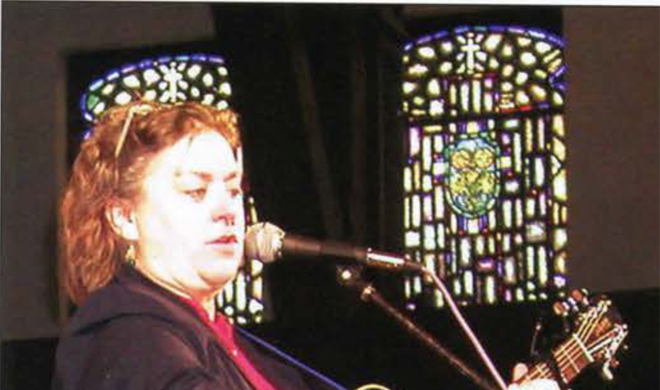Women from around the U.S. and three of the seven Celtic nations gathered in Milwaukee in October for the Conference of Celtic Women, held at the sprawling former church that houses the city’s Irish Heritage Center.
Organized by Jean K. Bills, the Conference featured singers from Scotland, Brittany and the U.S.
“What makes these weekends so special is the bringing together of accomplished women from Celtic backgrounds,” said Bills, the founder and president of the Conference. “Celtic women traditionally have done great things behind the scenes. The Conference of Celtic Women allows us to showcase these extraordinary women and learn from them..”
One singer, presenter and a co-master of ceremonies was Irish-American singer Betsy McGovern. A folksinger with a pure, beautiful voice, McGovern founded the musical group Poor Clares in New Orleans shortly after she began her singing career in the city’s O’Flaherty’s Irish Pub.
Accompanying herself on the guitar, McGovern, whose family was displaced by Hurricane Katrina, sang songs she picked up in Louisiana that were based on old Irish folk songs.
She regularly performs for children with a group called “Young Audiences of New Orleans,” teaching them about musical instruments, the songs and stories of Ireland, as well as American heroes.
Maureen Jelks, born in Dundee, Scotland, and now residing in nearby Kirriemuir, told the tale of finding her voice at 40. Always afraid to enter singing contests, she finally screwed up her courage and was so relieved to have survived being on stage and remembering the words to the song, that she wasn’t even listening when the judges announced her as the winner.
Since then, Jelks has won many contests. A finalist in the “Best Singer in Scotland” competition hosted by the Traditional Music Awards, she was named an Ambassador for the Arts in Angus, Scotland in 2003. A member of The Tradition Bearers, a group that keeps traditional songs alive, she sang several songs particular to Dundee.
Nolwen Monjarret, with her deep mezzo voice, sang traditional songs from her native Brittany. One of the dwindling number of native speakers of Breton, thought by some linguists to be the oldest Gaelic language, Monjarret is a second-generation musician devoted to keeping the old musical traditions alive. Her late father, Polig, developed the concept of the Breton pipe band and founded the Lorient Interceltic Festival, the prototype for all Celtic festivals in Britanny today. She has appeared on two albums with the Chieftains, The Bells of Dublin and Celtic Wedding.
Two Scots women from North Carolina brought their expertise to bear on different areas of Scottish culture. Marjorie Logie Warren, born in Glasgow, is a Scottish weaving expert and a tartan designer. Her Thistle Studios produced a tartan for the Conference, which was worn in vest or scarf form by many of the presenters and participants.
“It’s the first Scottish tartan designed for women,” said Warren. In her talk on the “Nine Trades of Dundee,” she showed slides of Scotland and displayed reproductions of old Scottish hats worn to identify members of different trades.
Flora MacDonald Gammon shared a few songs from the Appalachians that are derived from Scots and Irish traditional tunes, and traced the migration of Scots to the region.
Gammon, recognized as the “first lady of Scottish history and folk music.” is a teacher of Scottish history at Elderhostels and N.C. schools. She is also director of music at the Grandfather Mountain Highland Games in North Carolina and teaches at the Haywood Scottish Dancers. A predecessor, another Flora MacDonald, helped Bonnie Prince Charlie escape from the English.
Karin Stanley, a native of Dublin who has lived in Boston for nearly 20 years, spoke on “Reflections on an Irish Garden: History, Design and Art Inspiration.” Stanley showed many slides of classical gardens around Irish manor houses and explained the difference between Irish and the more formal English gardens. A sculptor who creates stone art embellished with Celtic designs, Stanley is also a garden designer who wrote her landscape design master’s thesis on the Irish Garden.
Milwaukee storyteller and educator Jean-Andrew also participated. A school librarian, who entertains audiences of all ages and teaches graduate courses in storytelling, she co-founded the Milwaukee Area Story Tells (M.A.S.T.) Guild in 1985.
The founder of the Celtic Studies Program at the University of Wisconsin at Milwaukee, John Gleeson, was one of the few men who attended the conference. Born in Dublin, Gleeson, who teaches Irish language courses and leads tours to Ireland has long been a supporter of the Conference and he served as co-master of cermonies.
“This is about Celtic culture, not about women versus men,” explained Bills.
Between sessions, participants at the Conference had the opportunity to purchase Celtic music CDs and crafts such as jewelry, scarves, and tartans.
The 2006 conference will be held in Milwaukee from October 12-14. Bills says she already has confirmation from two speakers in Ireland, two in Scotland, and lots more musicians. ♦


Leave a Reply